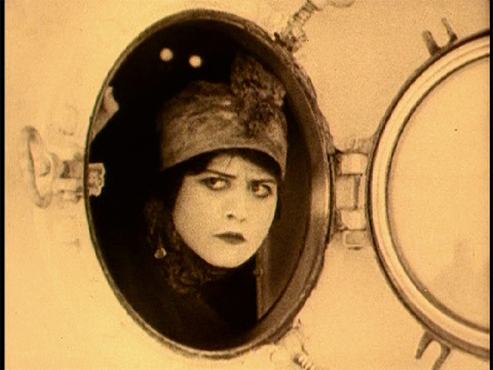A Fool There Was (Frank Powell, 1915): USA
Reviewed by Byron Potau. Viewed on DVD.

The film that catapulted actress Theda Bara to stardom and established her as cinema’s first vamp and sex symbol, A Fool There Was has an interesting storyline, but lacks the kind of performance from Bara that you would expect. This melodrama based on a play by Porter Emerson Browne which was in turn based on Rudyard Kipling’s poem The Vampire, does contain a fine performance, but not from Bara whose resulting popularity which seems due mostly to Fox’s publicity campaign which cultivated an exotic persona for her. Wild rumors such as her name being an anagram for Arab Death fed into her persona and helped to launch her popularity.
Bara plays the vampire, an evil minded woman who enjoys destroying wealthy men. When she gets snubbed by Kate Schuyler (Mabel Frenyear) at a country club she sets her sights on Kate’s husband, John (Edward Jose) a wealthy and successful diplomat. When John is sent to Italy on business and his wife is unable to accompany him the Vampire seizes her opportunity and seduces him while they sail to Italy. While there she consumes him and he forsakes his reputation and neglects his duties, his wife , and his young daughter all for the sake of his new mistress.
Looking at the film now it naturally seems a bit dated in its execution, but the story of a woman luring men to their doom is certainly intriguing and has been a large part of the darker side of cinema ever since, the character of the vamp being the predecessor to the femme fatale. Yet, the film simply does not hold up as well as it should and that is in large part to Bara’s performance. Even then it seems that audiences must have loved the idea of the vamp, but Bara’s performance certainly seems to be lacking the deception, the sex appeal, the subtleties, and the cunning the role needed. She either lashes out violently or laughs hysterically. These seem to be the only two moods she can convey and they speak nothing about how she can hold men in her grasp. She doesn’t make her power over men believable. It is easy to see the influence of the character but she did not do half as much as she could have with such a juicy role.
The one who does show his acting talent in the film is Edward Jose as John Schuyler, her latest victim. Jose’s perfomance transforms Schuyler from a respectable family man into a desperate, simpering drunkard unable to control his baser urges. His deterioration is actually convincing as he deftly conveys the ugliness of alcoholism.
Bara would forever be associated with this type of character, however, it seems she had not yet perfected it. In this film you will find none of the risque costumes that helped make Bara one of the first sex symbols in cinema. Because this is only one of three Bara films, of the approximately 40 she made, to exist, the rest having been destroyed in a fire at Fox’s film vault, it remains extremely valuable for those who want to see Bara in action. It’s too bad, becasue I think she most surely did better work than she does here. Her sexual appeal has also dated poorly as opposed to other early sex symbols of the cinema like Clara Bow or Louise Brooks who still manage to entice. Nevertheless, Bara paved the way for those sex symbols and others to follow so we do owe her that.
About this entry
You’re currently reading “A Fool There Was (Frank Powell, 1915): USA,” an entry on Student Film Reviews
- Published:
- 03.19.10 / 8pm
- Category:
- DVD, Films, Silent films
No comments
Jump to comment form | comments rss [?] | trackback uri [?]